restoring the dignity of South Africans through job creation


Tshediso Matona
Najwah Allie-Edries highlights SA’s rocky transformation journey
Africa Month: creating the Africa we want

restoring the dignity of South Africans through job creation


Tshediso Matona
Najwah Allie-Edries highlights SA’s rocky transformation journey
Africa Month: creating the Africa we want
24. National Orders recipients embody founding values of SA

Recognition for a lifetime of service
26. Ear recognition backed to become biometric solution for child identification in South Africa

A revolutionary technology to ensure the safety of children across the country
28. Game, set, match: SA’s investment target surpasses expectation
SA is gaining traction in the race to unlock economic opportunities
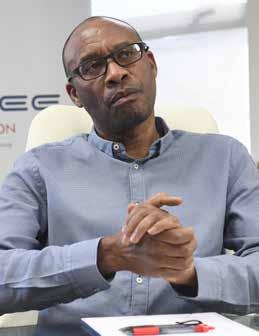
30. Towards a low carbon economy
Decarbonisation is key in achieving sustainability goals
34. New programme to support newly qualified teachers
Making the transition from student to teacher easier
36. AfCFTA can be a catalyst for Africa’s prosperity
Creating the world’s largest free trade zone
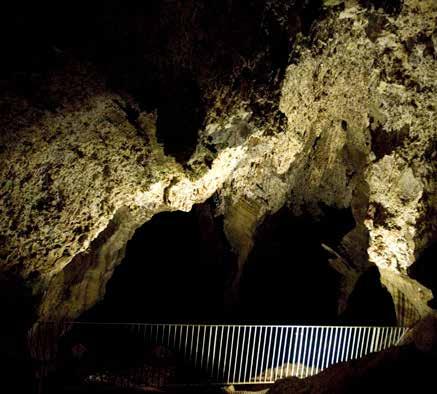
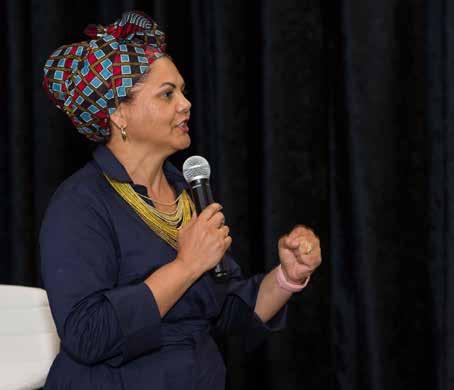
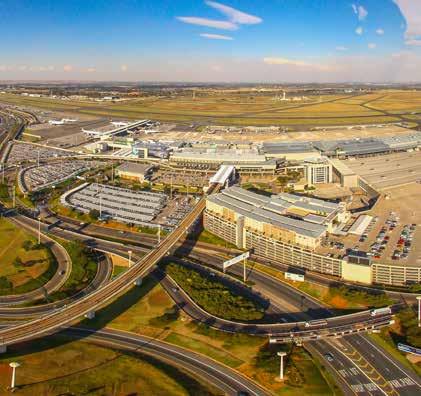

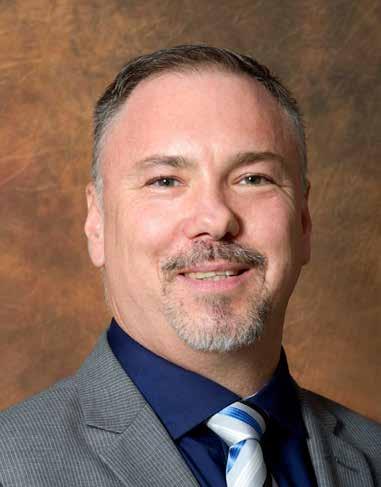
In May, Africa comes together to celebrate Africa Month –a time when the continent commemorates the founding of the Organisation of African Unity (OAU). This year marks the 60th anniversary of the founding of the OAU, which became the African Union (AU) in 2002.
South Africa supports the Pan African vision of ‘building the Africa we want’: an integrated, prosperous and peaceful Africa, driven by its own citizens, and representing a dynamic force in the international arena; and Agenda 2063 – Africa’s development blueprint to achieve inclusive and sustainable socioeconomic development over a 50-year period.
Government is, therefore, deeply concerned about the recent conflict in Sudan and calls for peace and calm among the parties involved, in keeping with the AU objective of silencing the guns on the continent.
Agenda 2063 calls for greater collaboration and support for African-led initiatives to ensure the achievement of the aspirations of Africans. One such initiative
is the African Continental Free Trade Area (AfCFTA), which is aimed at unlocking ‘Africa’s potential as a global economic powerhouse’. Under the AfCFTA, more than 1.3 billion people will be connected into a single market, with a combined gross domestic product of approxi-
mately US$ 3.4 trillion.
According to Made by Africa, a report by the International Trade Centre in partnership with the AU that was published in November 2022, Africa accounts for just 2.3% of global exports, and many of these are primary commodities and natu-
ral resources. Only 14% of the continent’s exports go to other African countries. As Trade, Industry and Competition Minister Ebrahim Patel says, “Africa does not produce what it consumes and does not consume what it produces”.
The free-trade initiative is more important than ever. At the 55th session of the Economic Commission for Africa in March, 2023 it was stated that the ability of African countries to ‘effectively tackle poverty and inequality is now severely constrained, given declining economic growth, narrowing fiscal space, rising debt, commodity shocks and tightening global financial conditions’.
Nearly 545 million African people still live in extreme poverty and given the current financial environment, the poverty and inequality targets set out in the 2030 Agenda for Sustainable Development and Agenda 2063 will be hard to meet without aggressively implementing the AfCFTA and other AU development initiatives, such as Visafree Africa.In mid-April 2023, the
in 2023 by Ugandan President Yoweri Museveni at the end of February, Tanzanian President Samia Suluhu Hassan in March and Namibian President Hage
The visits were aimed at reviewing and bolstering political, social and economic relations –all of which are vital if Africa is to advance its industrialisation and economic development. Continental integration will boost the low rate of intra-African trade and create continental and regional value chains. These in turn will help stabilise economies, create jobs, attract investments, and reduce poverty – the cause of many of the conflicts that hamper development on the
This Africa Month, we can celebrate that the Cradle of Humankind is rekindling its
According to the Cradle of Humankind’s website, the world heritage site positions Africa as the original home of humankind, “all of humanity shares an African heritage. We are one diverse species across the globe, with our roots in Africa”.

Government honours the role of workers in developing the country’s economy and helping us achieve the stated objectives contained in the Economic Reconstruction and Recovery Plan. Workers are an integral part of government’s delivery on its promises to citizens.
South Africa joined the world in commemorating International Workers’ Day on 1 May. Government has also declared May as Workers’ Month to highlight our support for workers’ rights.
Born from the protracted struggle for workers’ rights and social justice of the late 1800s, Workers’ Day has been observed in many countries around the world since 1891.
Workers’ Day does not only signify the sacrifices made on the long road towards fair employment standards but also marks the bitter battle against apartheid, in which trade unions played a fundamental role.
For decades, workers in South Africa were exploited and oppressed because apartheid
thrived on cheap labour and disregard for human rights. Trade unions became an important source of resistance, resulting in the struggle for better working conditions and the struggle to overthrow systemic segregation. The democratic government
respects workers’ rights and continues to formulate policies that support a conducive and non-discriminatory workplace.
Various measures aimed at addressing labour issues and improving working conditions have been put in place, including laws
that guide how workers should be treated and remunerated.
The Constitution of the Republic of South Africa, 1996, guarantees workers' rights, such as the right to strike, which are also recognised under the Labour Relations Act, 1995 (Act 66 of 1995). The Act also facilitates collective bargaining, including a provision for bargaining councils.
The Employment Equity Act, 1998 (Act 55 of 1998) prohibits unfair discrimination based on race, gender, sex, pregnancy and marital status, among other things.

The Unemployment Insurance Fund gives short-term relief to workers when they become unemployed or are unable to work because of maternity, adoption and parental leave or illness. It also provides relief to the dependants of a deceased contributor.
In 2018, government introduced the National Minimum Wage – a policy instrument specifying the floor level below which no employee should be paid.
In April 2023, President Cyril Ramaphosa signed the Employment Equity Amendment Bill of 2020 into law. It seeks to progress the transformation of South Africa’s workforce by setting equity targets for economic sectors and geographical regions, and requiring enterprises to develop transformation plans, with new measures to also promote workplace diversity and equality.
In addition, government continues to implement programmes aimed at fighting unemployment. One of them is the Youth Employment Service (YES), which works in partnership with the private sector to provide work
experience for youth in order to bridge the gap between the years of experience that employers are looking for and new entrants into the labour market.
Approximately R6 billion in youth salaries has been injected to the economy, over 100 000 work experience opportunities have been created and more than 2 200 corporate sign-ups have taken place under the YES programme.
In response to the devastating impact of the COVID-19 pandemic, which resulted in many people losing jobs, government established the Presidential Employment Stimulus – to create jobs and strengthen livelihoods,
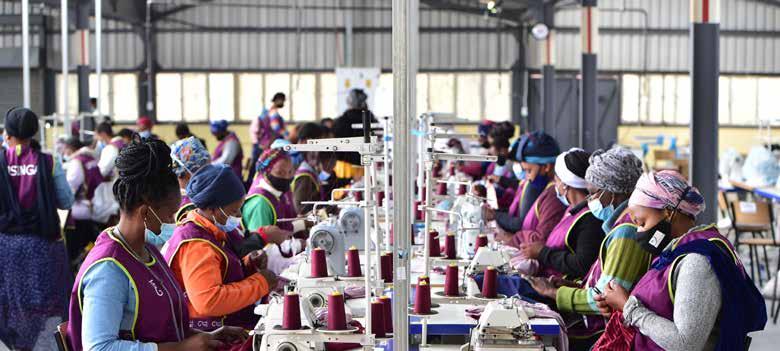
support meaningful work while the labour market recovers and augment existing commitments to doing so. By October 2022, the programme had benefitted over one million people.
The South Africa Investment Conference, which recently held its fifth iteration, also contributes to national goals of socioeconomic development, creating sustainable jobs, and reducing poverty and inequality.
Investments made during the conference have resulted in the establishment of new factories, call centres, solar power plants, undersea fibre optic cables, expansion of production lines and adoption of new technologies.
While government puts all these measures in place, we also have the responsibility to play our part by exercising our rights responsibly. As public servants, some of our roles require us to save people’s lives and protect the security of our country. Essential workers also have the right to let their grievances heard and while doing so, should always remember the pledge they made to protect and save lives.
Let us wear our workers’ crowns proudly, enjoy our democratic rights responsibly and ensure that we leave no one behind in our quest to create a better South Africa for all.
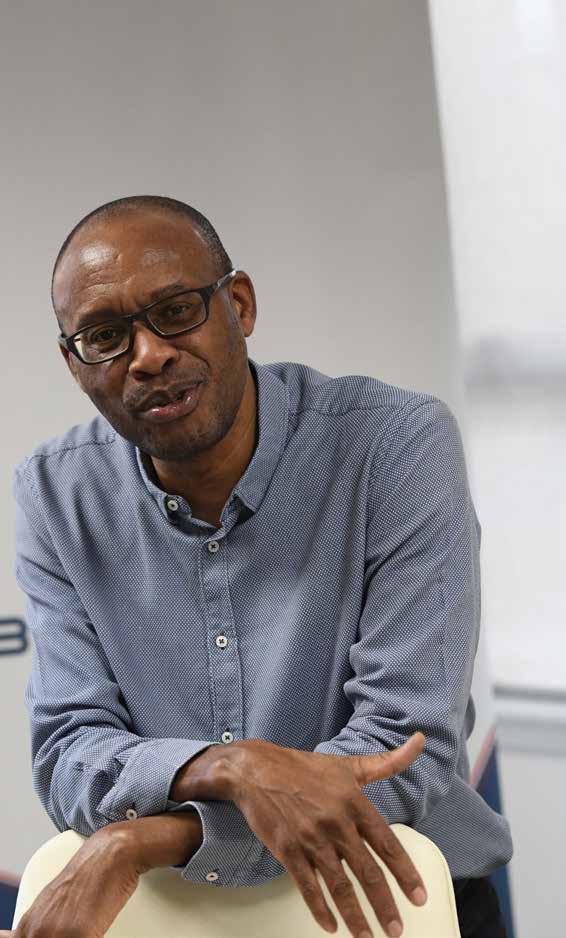
When democratic South Africa was in the spring of its life, a crucial piece of legislation was enacted among a raft that was meant to mend relations as the country transitioned from its tumultuous past.
With the stroke of a pen, then President Thabo Mbeki, on 7 January 2003, signed into law the Broadbased Black Economic Empowerment (B-BBEE) Act, 2003 (Act 53 of 2003), colloquially referred to as the Black Economic Empowerment (BEE) policy. This was a culmination of a rigorous Parliamentary process aimed at ensuring a broader participation of black people in the economy.
It was only 14 years later that the B-BBEE Commission was established. The
regulator, which derives its mandate from the B-BBEE Act of 2003, oversees, supervises and promotes adherence with the Act. It also strengthens and fosters collaboration between the public and private sectors in order to promote and safeguard the Act. Having acted as B-BBEE Commissioner between August 2022 and January 2023, veteran public servant Tshediso Matona assumed his fulltime tenure in February this year.
Speaking to Public Sector Manager (PSM) magazine from the regulator’s offices in Pretoria, Matona was frank about the policy’s triumphs and Achilles’ heel.
Reflecting, he said: “The capacity of an organisation has to grow organically, in tandem with the demands for the function, especially
given the fact that the capacity demands of the commission happened at the time of severe fiscal constraints in the State.”
Within six year, the regulator had established that there was a demand for its services that it was ‘finding difficult to meet’.
“There is a need for significant capacitation [of the Commission] by way of additional hands on deck,” he explained.
“I was very impressed that, [as] small as the cohort of officials that are in the commission [are], they are highly, highly expert at what they do. This is a small professional team that has gained so much experience in such a short space of time – interpreting legislation, investigating matters [and] providing advice. Now we need to scale-up. It’s a conversation that I am having with the department [Department of Trade, Industry and Competition]." he lauded, saying the work of the commission is important for the country.
Since its inception, 620 ownership transactions – with a total value of R540 billion –have been submitted to the regulator for registration. As required by the Act, these were deals valued at R25 million and above.
In its 2023/24 Annual Perfor-
mance Plan, the commission stated that, 456 transactions were registered based on meeting compliance and registration requirements.
Of transactions assessed, 237 accepted the B-BBEE Commission’s remedial recommendations; 67 are pending while the parties are considering the commission’s position; and 145 have been referred for investigations for non-compliance,
lished, the shop is open and the shop is transacting. We are seeing an increasing number of the public – black people –who are demanding services from the commission,” Matona expounded.
Enquires, he said, ranged from people who wanted advice on how to go about doing deals, to filing of complaints regarding fronting.
A significant bulk of matters
is that we are traversing a path that has never been travelled in South Arica. BEE is new to all – black and white – and it was always important that we allow ourselves to learn and improve on the legislation and the policy as we go along the way.
“There are black people who are owners of businesses who have a stake in the economy that they would never have had if we did not have a BEE policy or if we did not have a democratic South Africa,” he said.
His main concern, however, was that “it [the policy] should not just benefit a few individuals, you have to make the circle bigger”.
including misrepresentation and fronting.
“That represents value transacted with black people. We do not have numbers for prior to six years because that function has only been performed with the establishment of the commission,” he elaborated.
“As far as the commission is concerned, it is still a start-up – six years is young but we are pleased that the shop is estab -
before the Commission related to fronting and misrepresentation of B-BBEE credentials.
Taking stock of the country’s BEE policy journey, he explained that while the journey had its highs, severe challenges had also hampered progress.
“The important point to make
“There is much more to BEE than the individuals. There are thousands of black-owned enterprises that are suppliers to both the State and the private sector, especially those that want to transact with government,” explained that the Commissioner.
Enterprise and skills development, procurement, and supporting citizens through community social investment initiatives are also recognised under the policy.
“We have numerous success stories in respect to how the
“We assumed that there would be good faith. Remember, it was one of the earliest pieces of legislation after 1994, built on the notion that there would be rational reconciliation”.
legislation has had an impact on black people. Definitely not enough, one must acknowledge,” he confessed.
When the Act was enacted in 2003, Matona served as Deputy Director-General at the then Department of Trade and Industry, custodian of the Act.
“We were very optimistic. We had high expectations about what the take up would be. We thought we would be much further down the line than it has actually turned out to be the case by now,” he stressed.
Perverse incentives through fronting show that there is circumvention of what the legislation was meant to achieve, he explained.
“We assumed that there would be good faith. Remember, it was one of the earliest pieces of legislation after 1994, built on the notion that there would be rational reconciliation.
“The Constitution says ‘the injustices of the past must be redressed through measures undertaken by the State’s legislative and regulatory measures. The philosophy of BEE assumed that there would be goodwill,” he bemoaned.
“We made peace and said we are building a new country, but it is a country that is going to be built on the principle that we are equal in the law and there
must be some sort of redress. The redress – specifically BEE – we designed to be a ‘win-win’. Companies that are doing BEE, they are getting something in return. It will work through the market because the State cannot force people to be partners, we can merely set the parameters and the standards. It is semivoluntary.”
Secondly, he said, there was a need for a mechanism to trace the performance of BEE in terms of transactions.
Critics of the policy argue that BEE had not progressed sufficiently and had not achieved the required changes to transform the economy and that it should be abolished.
This, he said, would be a 'serious national mistake'.
“You do not throw away one of the tools that have been created to achieve precisely those changes that ensure that the economy reflects the demographics of the country. If the tool is blunt, sharpen it. You do not throw it away [when] you do not have other tools. It would be a terrible mistake because the problems that BEE was supposed to address, are still there."
Matona decried what he described as a lackadaisical and nonchalant approach to the implementation of the Act.
“There is a culture of tick box exercise with regard to compliance but no real authentic
desire to see meaningful change, access of black people into economic opportunities, in particular, ownership. We have introduced penalties in the legislation for things like fronting. It would seem to me there is still room to penalise non-compliance by virtue of even not submitting an annual report,” he proferred. He added that it was baffling that businesses complied with every requirement of good corporate governance bar BEE laws.
“People complain about crime, the roots of crime are people who do not have meaningful participation in society. BEE is only one area in which unresolved issues manifest themselves,” he ventured.
In its National Status and Trends on Broad-Based Report for 2021, the Commission revealed that there had been a 1.5% shrinkage in the levels of transformation.
It reflected an overall decline of 29.5% in black ownership from 31% in 2020, management control is sitting at 51.6% overall from 57% in 2020. “Further, there was 0% of entities listed on the JSE [Johannesburg Stock Exchange] that are 100% blackowned, which is the same as in 2020, while 3% were reported in 2019 and 1% in 2018,” he said.
Despite the relative gloom, Matona applauded gains made in empowering black businesses
through the Enterprise and Supplier Development (ESD) Programme.
In a study released in February 2023, the commission found that the quantum of resources available for ESD was quite significant, with reported budget categories ranging from R101 000 to R999 999, R1 million to R5 million and R21 million or more. The bulk was in the R1 million to R5 million range, and the overall total for 2021 being in the region of R26 billion.
However, it found that in 2022, only 61% of the funds allocated to ESD were implemented, a continuing trend over the past five years (2017: 44%; 2018: 60%; 2019: 51% and 2020: 61%).
“The truth is that there are many businesses today that have in their supply chain black businesses. ESD is one of the critical instruments, second to the issue of ownership – shares – this one holds the most potential to really make a difference because it says ‘in your value chain’, surely there must be something that black people can manufacture,” he spressed.
He emphasised that companies should be “deliberate” about creating those businesses.
“Give them access to capital, give them access to skills, technology. To simply say ‘no, they are not there, we do not see them’ is not enough,” he concluded.
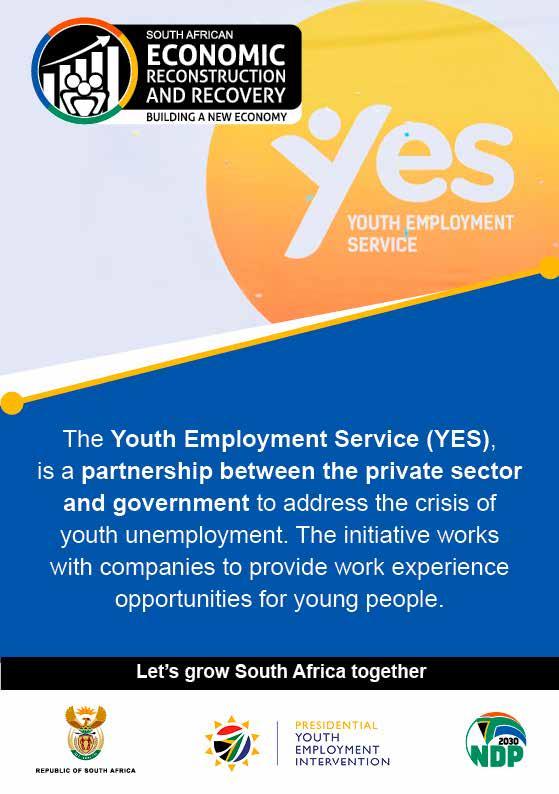
Restoring the dignity of South African citizens by facilitating job creation and employment is precious and deeply rewarding for the Head of the Jobs Fund at National Treasury, Najwah Allie-Edries.
This is rightfully so, as her job also fulfills government’s priority of economic transformation and job creation, which contributes to the National Development Plan Vision 2030’s target of reducing unemployment by 2030, and creating a working labour force of 24 million.
Allie-Edries joined National Treasury in 2004 as the Deputy Director-General for Corporate Services, before joining the Public Investment Corportation as the Chief Operations Officer of CBS Property Group in 2007.
In 2009, she returned to National Treasury to support the work on the Ministerial Committee on Social Security and Retirement Reform and was, in 2011, appointed in her current position, which she was the first to occupy.
“I was responsible for leading the design and launch of the Jobs Fund, establishing a Project Management Unit, developing the Jobs Fund Investment Strategy, establishing its governance framework and building a capable team that would
implement the programme,” she explains.
The Jobs Fund was established in 2011 when National Treasury invested R9 billion to support innovative approaches and initiatives to job creation. The fund awards once-off grants to projects that demonstrate sustainable job creation potential.
The Jobs Fund is not a mass employment programme, and it is not intended to tackle long-term, structural causes of low growth and unemployment. However, it complements these efforts with a targeted programme of support for effective labour market interventions that result in sustainable employment creation.
“Broadly, we look for innova-
tion and sustainability, as well as interventions that have the potential to be scaled-up or replicated. We want to support interventions that address key barriers to entry in the labour market and we have a specific focus on women and youth,” explains Allie-Edries.
Funded projects are selected through a competitive process to ensure that public funding is channelled directly to initiatives most likely to have the desired impact.
Allies-Edries’s overall responsibilities comprise strategic and operational aspects that contribute to achieving the fund’s mandate.
Her career journey dates back to 1985, when she was em-
ployed as a labour researcher at the Southern Africa Labour Development and Research Unit. In 1993, she was appointed as Senior Manpower Policy Advisor at the National Manpower Commission.
She also held senior positions at the Development Bank of Southern Africa from 1994 to 1997, followed by her appointment as the Programme Manager for Transformation at the South African Revenue Service in 1999.
“My various jobs have al-
lowed me to live my personal mission statement which is about making a positive difference at a basic-need level,” she says.
Allie-Edries explains that, back in 2011, unemployment was unacceptably high in South Africa and no one was testing the efficacy of job creation models at the time, so it was important for government to better understand which interventions
“The R9 billion was allocated to job creation and social impact programmes. As at 31 December 2022, we had a portfolio of 163 projects, 47 of which are still in implementation,” explains Allie-Edries, adding that a total of R6.27 billion had been disbursed to projects during the same period.

“The current projects will be implemented until the 2025/26 financial year,” adds AllieEdries.
Allie-Edries highlights that by the end of 2023, the fund had
facilitated 299 691 jobs, of which 193 478 were permanent, 82 997 temporary and seasonal, and 23 216 internships.
“The jobs are filled by predominantly youth (64%), women (58%), and have benefited mainly previously disadvantaged individuals (98%). Furthermore, 303 572 beneficiaries have received skills development training. A significant numberof Jobs Fund projectsare enterprise development interventions and I am pleased to say that to date 54 278 small, medium and micro enterprises, and 16 699 smallholder farmers have been supported," she says.
In addition, 10 176 jobs have been retained as a result of the Jobs Fund’s COVID-19 relief package, and an additional 51 130 jobs were created post the projects’ implementation periods, revealing the catalytic effect of the Jobs Fund Grant over time.
The fund is in the process of applying for additional funding as there is a need for continued financial support by government to solve intractable socio-economic challenges.
“Unless further funds are allocated to the Jobs Fund, the programme will wind down and close,” she says.
Allies-Edries reveals that independent evaluations and research conducted on the fund suggest that operating on challenge fund principles, as is the case with the Jobs Fund, has enabled government to:
• Crowd-in and maintain private sector partnerships that use the capacity of the private sector to present innovative and viable solutions to the employment crisis, whilst avoiding the market distortions that can be caused by direct subsidy or grantfunding.
• Address both the demand
and supply constraints to employment creation.
• Incentivise investment in innovation through risk-sharing – the fund has creatively applied public funds in ways that lower the market risk associated with certain types of job creation interventions, primarily though matching grants which share the risk associated with innovation.
• Leverage private sector and other resources to co-finance and competently implement breakthrough initiatives for the benefit of targeted beneficiaries. The matching grant mechanism of the Jobs
Fund has to date tripled the value of government’s investment in job creation through its projects, leveraging an additional R12.74 billion in funding.
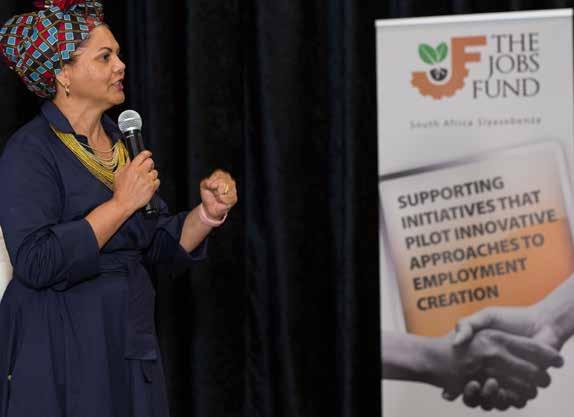
• Create new, long-term jobs –this approach has the ability to create sustainable jobs that endure beyond the funding.
• Achieve high levels of value for money – leveraging private capital and using a competitive process to fund only the best ideas has enabled the Jobs Fund to generated new, sustainable job creation in a cost-efficient
and cost-effective way.
• Generate learning and evidence – the strong results measurement function of the Jobs Fund has generated critical, context relevant information on the mechanics of supported interventions i.e. what works and what does not.
Allies-Edries, who boasts 26 years’ experience in public service, believes that being a public servant is a privilege.
“We have the opportunity, on a daily basis, to contribute to building a country that prospers and serves its citizens. We have to build for the future and there is no time to waste,” she notes. She holds a Bachelor of Social Science Degree in Industrial Sociology and Industrial Psychology and an Honours Degree in Industrial Sociology from the University of Cape Town (UCT). Her other qualifications include Project Management from the University of South Africa and Understanding Poverty and Inequality from UCT’s Graduate School of Development Policy and Practice.
Organisations can apply for funding when the Jobs Fund opens calls for proposals.
For more information, visit www.jobsfund.org.za or email jobsfund@treasury.gov.za
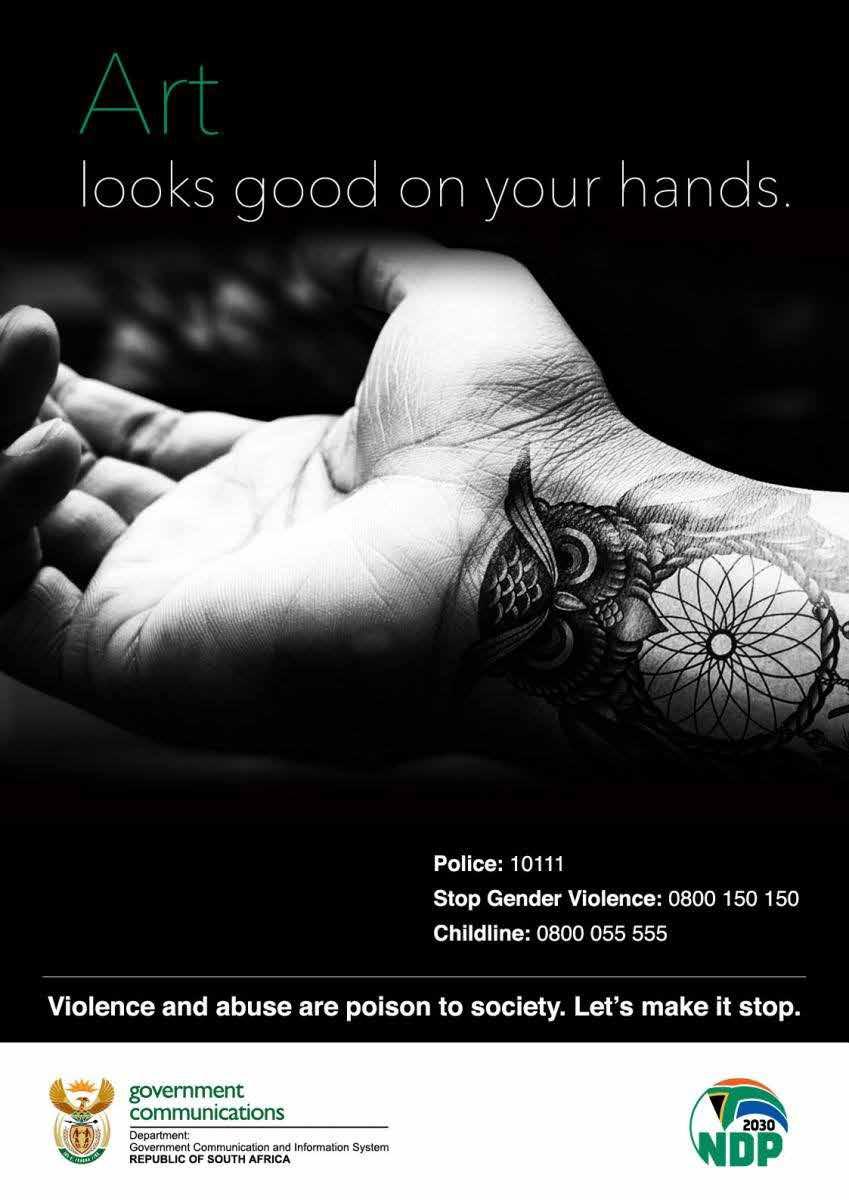
"When I arrived at the hospital, nobody knew about environmental health. Even I did not know what it would look like in a hospital setting," explained Mokhadi.
With little to no support, the then 24-year-old began to make a name for himself and that would, over the years, earn him notable accolades.
That year, he came second in the Enviro2000 competition run by the Free State Department of Education.
sustainability and a leader in the global movement for environmental health and justice.
Mokhadi joined the HCWH network in 2016, and adopted two goals: waste and chemicals. At the time, only the Western Cape Health Department and private health network hospitals were part of the initiative.
Undeterred by a limit in resources, a young environmental health practitioner (EHP) from the Free State is forging ahead in trailblazing a path in his professional field.

A decade ago, as a wet behind the ears novice, Tshepo Mokhadi became the first EHP to be employed at the Bongani Regional Hospital in Thusong, Welkom.
His latest recognition came in November 2022, when he was awarded the Public Sector Innovation Trailblazer Award at the annual Public Sector Innovation Awards. Organised by the Department of Public Service and Administration’s Centre for Public Service Innovation (CPSI), the awards honour innovation that has improved service delivery and made a difference in the lives of citizens or improved the efficiency of the public sector.
Mokhadi was first bitten by the environmental health bug as a 12-year-old Grade 7 pupil at Thusanong Primary School in Odendaalsrus, in the Free State.
“There was a provincial government competition on promoting environmental matters. We had a school food garden project and I think that is where the passion comes from,” he said. “From then, I told myself I want to be in this field. I [initially] almost studied environment management but then realised that environmental health was closer to me”.
Driven by a desire to leave a mark, the 33-year-old set out on a mission mission to align with support structures in the field. It was at this point that he stumbled upon Health Care Without Harm (HCWH), an international non-governmental organisation (NGO) that transforms healthcare worldwide. According to its website, the NGO does this to reduce environmental footprint and community anchor for
“I became the first member in the Free State. In 2016, Gauteng and KwaZulu-Natal [departments of health] also joined. The membership has now grown. In the Free State now, 50% to 60% of health facilities are part of this [network],” he explained.
Under the two goals, Bongani Regional Hospital has since developed and implemented strategic initiatives that promote sustainable practices in healthcare, rendering the public health sector more effective and resilient on climate actions and decarbonisation strategies.
In 2015, Mokhadi rolled out the Waste Information System, a tool first developed to monitor and evaluate medical waste generation at the facility.
The system later evolved into a software-based application called the Environmental Health Information System (EHIS), which was launched in January 2023 as a pilot. It renders monitoring and evaluation functions of waste, food, occupational health and safety, and water quality.
On the chemical goal, the hospital has developed and implemented the Integrated Pest Management System.
“The system was implemented in phases due to financial constraints. It introduced alternative pest control measures that could be implemented within a hospital environment to render a more sustainable, less toxic, environmentally sound and chemically free atmosphere, with an added cost effectiveness,” Mokhadi told Public Sector Manager magazine. In this regard, he said, he first had to develop a policy 'changeover'.
In 2017, he was part of Free State Department of Health’s technical committee that designed the Sustainable Pest Control Policy.
“We first had the policy. It was signed and approved and then came the implementation. We started introducing alternatives,” he explained. These included ultrasound pest repellents, flying insect bait traps, Ultraviolet-C germicidal lamp, eagle-eye bird repellents and hygiene monitoring devices.

“These are all things that were not here when I arrived,” he continued.
At the CPSI awards, the young professional walked away with a tablet as recognition for his innovative work.
While this may not seem like a big award, Mokhadi said the
tablet has become an important tool for his trade.
“With that tablet I have found a way to promote my advocacy work. [The] EHIS is centred on that tablet. Everything that I just told you about the EHIS is on that tablet. I didn’t know that they would give me something that I would actually use to advocate for environmental health wherever I go,” he said.
The tablet-based mobile application generates live data when the team does inspections.
“As soon as you click ‘done’, the report gets sent to whoever might need it. Even our head office when we were testing the system two weeks ago at our sub-directorate in Bophelong, received the report as we were doing the inspection.”
While not technologically inclined, Mokhadi managed to develop the systems with the assistance of information technology staff and interns at the hospital.
Plans to implement the systems in other hospitals in the Free State are being hampered by a lack of resources.
“I am the only one with this tablet. The challenge is ‘how do we get tablets to other facilities?’. That’s where we are right now,” he exclaimed.
A staunch advocate of the decarbonisation of the health sector, Mokhadi is fixated with the future of the industry.
“In 2050, for example, how do we see the future of the industry? That was one of the questions that I was asked when I was completing my fellowship paper,” he said.
In March, he was officially recognised as a futurist after completing the coveted 'Futurist Futures 101 with Sohail Inayatullah' course and a supplementary research paper awarded by The Center for Futures Intelligence and Research.
In 2022, the Welkom native completed the year-long Atlantic Fellowship Programme on Leadership Development for Health Equity in South Africa. Provided by the Atlantic Institute, the programme strengthens the capacities of progressive social change
leaders to tackle the deep social and economic inequities that characterise South Africa and that impact on the health of its citizens.
He has since enrolled for an executive management programme with the International Hospitals Federation in pursuit of self-empowerment.
“I have aspirations of one day becoming a CEO [chief executive officer]," he said, adding that he is also training to become a leader in his field.
Until then, the ambitious EHP is dedicating all his energy to advocating for the establishment of an environmental health workforce in hospitals.
“If I can see more hospitals employing EHPs, I would be the happiest person ever,” he concluded.
Leading a team that was able to resuscitate the Gauteng Industrial Development Zone (GIDZ) is humbling for the Chief Executive Officer (CEO) Thandiwe Ngqobe.
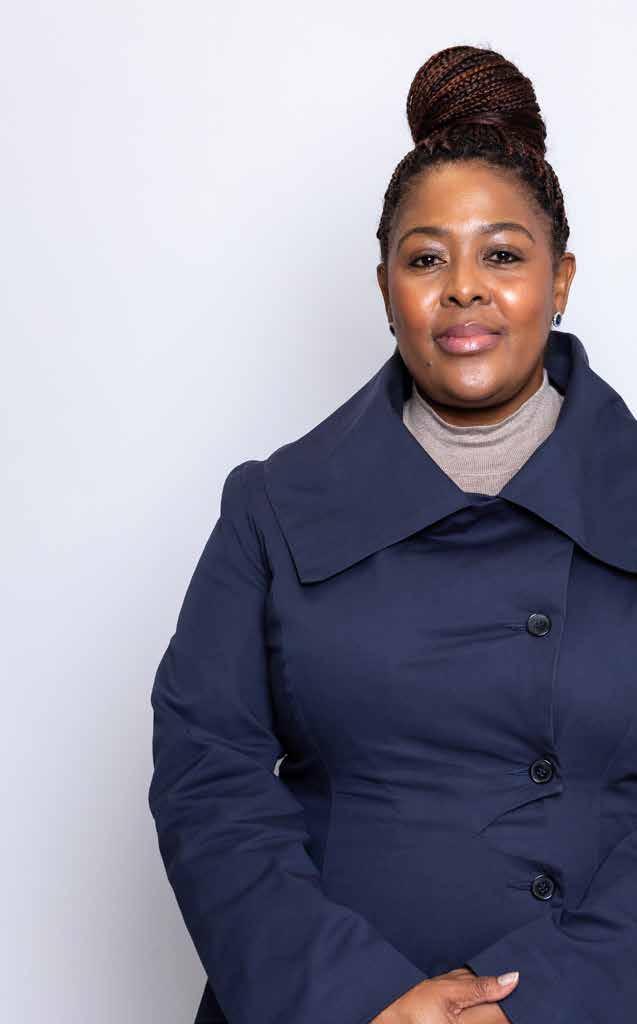
She has a huge responsibility of ensuring that the Special Economic Zone (SEZ) at OR Tambo International Airport is developed and operates optimally in order to help grow the provincial and national economy.
According to Ngqobe, the GIDZ project was about to collapse due to a lot of problems, especially on the construction side, when the former CEO left. She was subsequently trusted with reviving it when she grabbed the baton in 2021.
A subsidiary of the Gauteng Growth and Development
Agency (GGDA), the GIDZ was established in 2009.
Its mandate is to create an enabling platform for manufacturing investment opportunities that support the positioning of OR Tambo International Airport SEZ and Gauteng as globally competitive investment locations.
“SEZs are supposed to accelerate economic growth, largely through foreign direct investment. However, we also have domestic investors,” explains Ngqobe.
“We also ensure that operations of whoever we house in the SEZ are typically export orientated and global
players in various industries because our goal is to promote job creation, economic growth and enterprise development opportunities through partnerships, for the benefit of emerging enterprises or new industrialists,” she adds.
The GIDZ currently has a small team of 18 permanent employees and two interns, but Ngqobe envisages that more people will be employed as it grows.
Additionally, about 12 companies that are currently housed at the OR Tambo International Airport SEZ, including eight that are still under construction, employ thousands of citizens and Ngqobe says they will continue to do so as they grow operations.
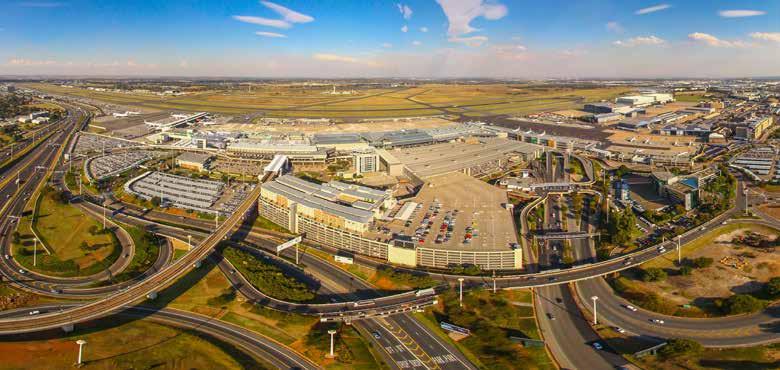
Striking partnerships with global players is what excites her the most.
“We recently launched a jewellery manufacturing precinct through a joint venture between Nungu Diamonds [a South African company] and a Belgian company called Pluczenik. The launch was officiated by King Phillipe of Belgium as part of his South African State Visit in March,” she recounted.
“When I joined the GIDZ, there were only 13 staff members. I have sleepless nights because I constantly think of what we are going to do next and how
many more people we can afford to employ in order to make this project a success,” she beamed.
Apart from providing strategic leadership, Ngqobe’s job is to remind companies why they should invest in the GIDZ, ensuring that Gauteng residents get employment opportunities.

She is the right person for the job, given her extensive work experience in the public sector, including serving in various portfolios as an executive manager. She holds a Bachelor of Commerce in Accounting and Auditing Degree and a postgraduate Diploma in Management from the University of the Witwatersrand.
Ngqobe started her career as an auditor at the office of
the Auditor-General of South Africa, where she worked for about four years. She then worked as a Deputy Senior Manager at the Government Garage in the Free State. That is where her love for the Public Service really started.
“I just enjoy putting systems in place in order to improve how government works,” she says.
In 1999, she moved to National Treasury and was excited to learn more about financial management systems in government and general financial management.
This was at a time when government was moving from the previous legislation to the Public Finance Management Act (PFMA), 1999 (Act 1 of 1999).
“I was part of something new, something that advances the cause of government, particularly on financial management. I was there until October 2000 when the PFMA [of 1999] came into effect,” she says.
As part of the request from National Treasury that officials who were involved in the development of the Act be placed in provinces to oversee its implementation, Ngqobe was placed at the Gauteng Treasury as a director.
She left the provincial Treas-
ury in 2007 as a chief director for a chief operations officer job at the Gauteng Enterprise Propeller, a provincial government entity that supports small business development.
In 2012, she decided to take a break from work. During that period, she did some consultancy work and the provincial government asked her to help set up a project management office at the GGDA, where she worked closely with the then Group CEO for about a year.
Thereafter, she worked at the
National Home Builders Registration Council as the Chief Operations Officer on a fiveyear contract, before returning to the provincial government to join the GIDZ.
She then worked closely with the former CEO of GIDZ to set up systems, but she had no intention of staying.
“I wanted to help and leave, but the contract of the former CEO ended in 2021 and I was appointed as CEO. Initially I refused, but I was convinced that it would not be for long and I would step down as soon as there was stability,” she explains.
Her new appointment coincided with the appointment of a new board, and they all put hands on deck to solve problems facing the entity.
“Although I did not want to stay, I now look back and it is my second year in this position,” she reminisces.
“We appointed various professionals, including engineers so that construction of the buildings could commence around April 2022,” she says.
Ngqobe attributes a huge bulk of the success achieved so far to the rapport that she built at National Treasury and her general experience in lead-
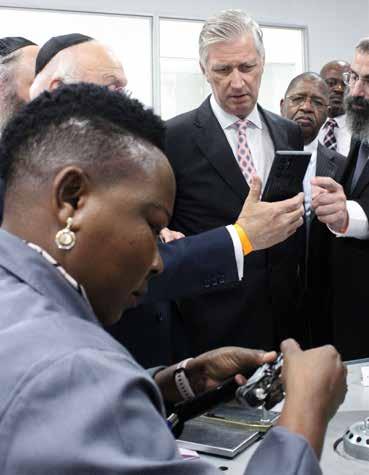
ership positions.
“I have always seen myself working for a government that can deliver and promote economic development because I was taught early in my career journey that corruption hurts careers, families and livelihoods,” she says.
She adds that she always aspires to make a difference and have an impact in people’s lives through the projects and programmes that she presides over.
“My quest is to deliver the best SEZ that creates jobs for citizens so that three years from now, other SEZs across the country will want to learn best practices from us so that we can all grow South Africa’s economy,” she stressed.
She has a strong belief that government, with the right leadership, can deliver, and that not all public servants are corrupt.
“Some of us just want to do it for future generations, and we go an extra mile because we want to do the right thing, not because we are bribed by anyone or that someone is watching,” she says.
She defines a true and professional public servant servant as one who puts the country and its people first.

One of the most important features of an effective democracy is a
free media. We should therefore be encouraged by the recent release of the latest World Press Freedom Index, in which South Africa significantly improved its ranking, moving up ten places from 35th in the world in 2022 to 25th this year.

The World Press Freedom Index, compiled annually by the organisation Reporters Without Borders, assesses the state of journalism in 180 countries and territories. It looks at the environment in which media workers operate with respect to political conditions, legal frameworks, safety and economic and socio-cultural context.
The organi-
sation defines press freedom as “the ability of journalists as individuals and collectives to select, produce and disseminate news in the public interest independent of political, economic, legal and social interference, and in the absence of threats to their physical and mental safety.”
As a relatively new democracy compared to those with more entrenched traditions of constitutionalism, we should be proud of our promotion of a free and independent media.
According to the survey, South Africa’s media landscape is “sturdy, diverse and dynamic” at a time when journalism has become an increasingly hazardous occupation in several other parts of the world.
Media freedom is a pillar of our democratic order. Our journalists continue to be the standard bearers for accountability and the empowerment of citizens. Media investigations have shone a spotlight
on corruption, the abuse of vulnerable people, the targeting of whistle-blowers, and all manner of wrongdoing within the state, the private sector, academia and other sectors.
The growth of citizen journalism and the spread of smartphones has made it possible for all manner of newsworthy events, including the actions and utterances of public figures, to be instantly disseminated to a mass audience.
In South Africa, journalists are free to work without censorship, harassment or judicial sanction, even when harshly criticising those in positions of authority.
However, the media in South Africa is also faced with a number of challenges. Several media institutions are struggling to survive in the face of technological change, shifting media consumption behaviour and the after-effects of the COVID-19 pandemic. These developments inevitably undermine the vibrancy and diversity of our media.
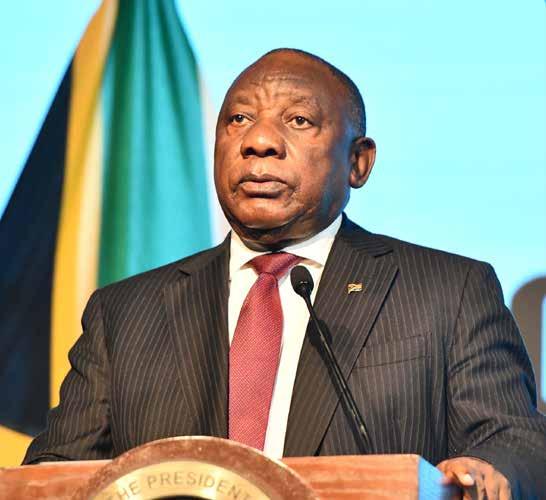
In recent years, there have been incidents where journalists have been threatened or assaulted in the course of their work. Some have been vilified on social media or targeted by political figures. As a soci-
ety, we must condemn such actions and work to prevent them.
It is indeed important for the media to hold those in authority in government, business and civil society to account in the public interest. At the same time, the media has an important role to play in educating and informing citizens on the issues that matter most to them.
Next year the country heads to a general election. As citi-
zens prepare to exercise this important civic responsibility, the media should use its reach and influence to encourage more citizens to register to vote. It should make a greater effort to cover issues in communities that sometimes receive little coverage in the mainstream media. Without seeking to unduly influence voters, the media should focus on the critical issues that matter to people when they need to decide who to vote for.
Media freedom, like so many of the rights contained in our Constitution, is hard won. It thrives in an environment where the media itself exercises due caution to be credible, accurate, fair and truthful always.
In the end, the state of our media is not defined by its ranking on an index, but by how it contributes to building a vibrant democracy with an informed, empowered and active citizenry.
National Orders represent the determination of humankind to rise above adversity, to persevere and to strive in pursuit of a better life and a better world.

This was said by President Cyril Ramaphosa during the first full National Orders investiture ceremony since 2019 – without COVID-19 restrictions. The event was held at the Sefako Makgatho Presidential Guesthouse in April. The National Orders are the highest awards that a country, through its President, bestows on its citizens and eminent for-
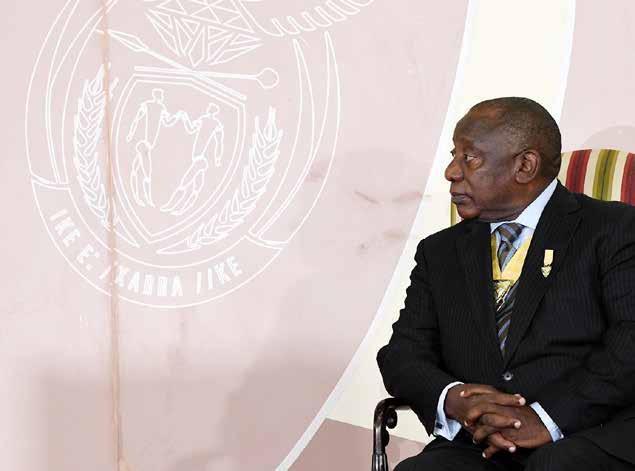
eign nationals.
“It is my honour and privilege to once more present and bestow South Africa’s highest accolades, the National Orders. Today we honour South Africans and foreign nationals who put themselves at the service of the country and its people.
“They have emerged from a process that involved the receipt
of nominations from across the length and breadth of the country, reflective of the broadly participatory nature of our honours system,” the President said.
President Ramaphosa said that in different ways and contexts, the men and women honoured contributed towards the freedom South Africans enjoy today.
“They did what they did; said what they said; and acted the way they did not for prestige or fame, nor for recognition or reward, but because it was the right thing to do. In doing the right thing, their actions had a lasting and enduring impact and live on long after them.
“Those who are receiving National Orders embody the founding values of the South African Republic; namely the

achievement of equality, the advancement of human rights and freedoms, and perhaps most importantly of all, human dignity,” the President said.
The President conferred the Order of Mendi for Bravery, the Order of Ikhamanga, the Order of the Baobab, the Order of Luthuli and the Order of the Companions of OR Tambo.
Conferring the Order of Mendi for Bravery, the President said the award is bestowed on South Africans who displayed great courage in trying to help others.
“All three of this year’s recipients of the Order of Mendi for Bravery lost their lives in the course of saving others. There can be no greater sacrifice,” he said.
Conferring the Order of Ikha-
manga, the President said that this award recognises South Africans who have excelled in the arts, culture, literature, music, journalism and sport.
“We are proud to count amongst this year’s recipients one of our sporting heroes and heroines that I was honoured to welcome here at the Union Buildings. Your victories have inspired a whole nation and a new generation.
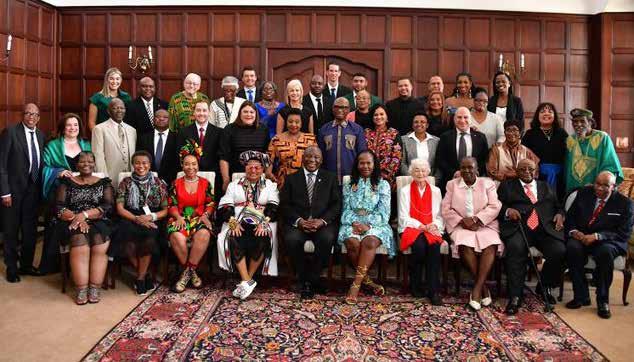
“I would like to single out for particular mention the awarding of the Order in Gold posthumously to Mr Solomon Popoli Linda. Even though his music was famous throughout the world, he never received his dues in his lifetime. As the democratic government, it is our humble wish that this honour will restore the dignity of Mr Linda and give comfort to his descendants,” the President said.
He also conferred the Order of Luthuli, which is awarded to South Africans who have contributed to the struggle for democracy, human rights, nation-building, justice and peace, as well as for the resolution of conflict.
This year’s recipients include eminent scholars, liberation fighters and activists who risked arrest, banishment, exile and even death to amplify the voice of the oppressed South African people on the world stage in the
The Order of the Baobab is awarded to South African citizens for distinguished service in the fields of business and the economy, science and medicine.

The President said that recognising these important contributions to the national life of the country inspires the younger generation to follow in their footsteps.
Conferring the Order of Mapungubwe, he explained that the
award recognises South Africans who have achieved excellence for the benefit of the country and beyond.
The President said that year’s recipients have excelled in the critical fields of physics as well as environmental science.
Speaking on the Order of the Companions of OR Tambo, President Ramaphosa said that it recognises eminent foreign nationals for friendship shown to South Africa.

“We salute this year’s recipients, some of whom are no longer with us, for using their talents to draw attention to the great injustice that was apartheid,” he said.
One of the patrons that were conferred this highest award in South Africa is Springbok Captain Siyamthanda ‘Siya’ Kolisi for his inspirational leadership and contribution to rugby.
Kolisi, who is currently injured, was conferred with the Order of Ikhamanga in Gold.
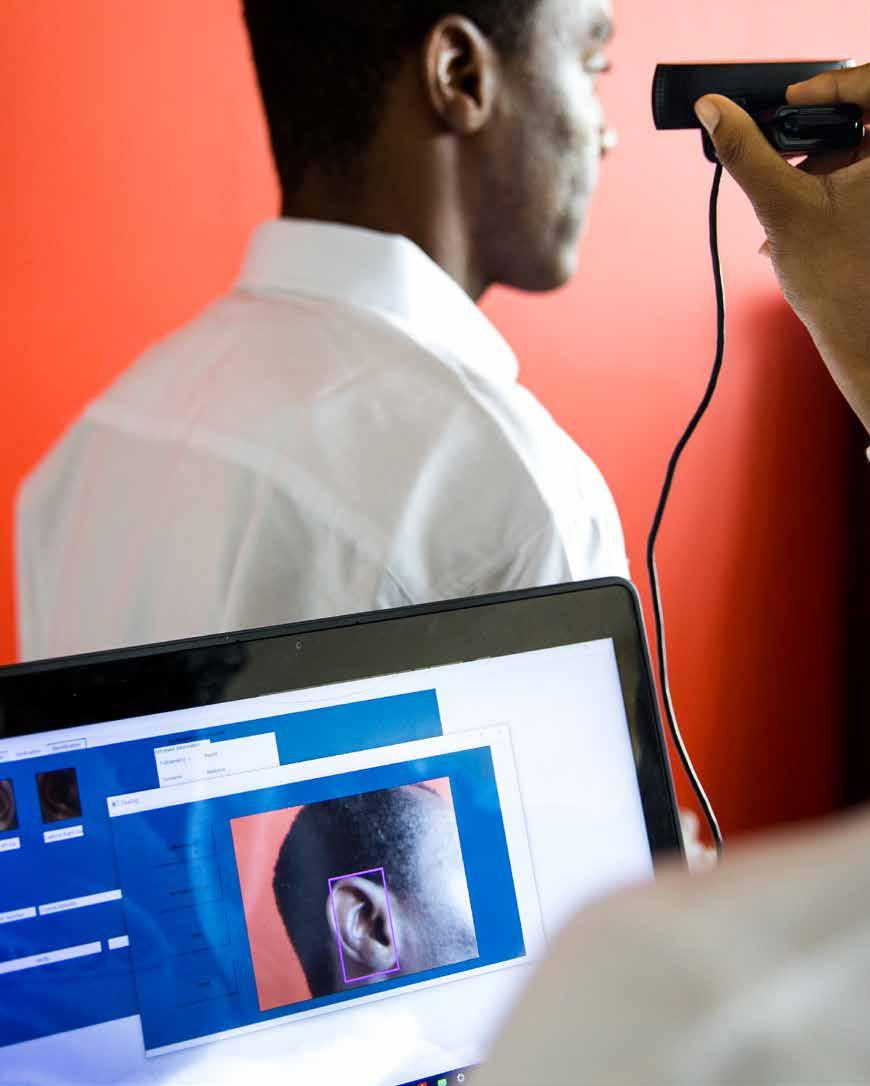
Drawing on its skills and innovation track record in biometrics, the Council for Scientific and Industrial Research (CSIR) has developed ear recognition technology through which the identity of an individual can be verified using the shape of their ears.
The development of biometric systems and solutions has revolutionised identification methods for industries around the world. Recognised for its accuracy, integrity, accessibility and multifunctional traits, biometrics has been adopted in healthcare, banking, security, electronic manufacturing and many more. With this growing trend in the information technology space, experts predict that the demand for biometric solutions will grow significantly in coming years.
The CSIR is specifically interested in biometric recognition for children. The technology has been developed to perform a live image capture of a child’s ear, followed by processing of the image for verification.
The captured ear image and the child’s biographical details are then registered in a database or registry. Therefore, upon presentation of a child’s identity document to a system, and verification of the ear biometric in person, a child can be positively identified and linked with her or his parents, reducing the chances of child abduction or identity theft.
“The technology will significantly reduce the problem of child trafficking and undocumented children in South Africa,” says CSIR researcher
Sthembile Ntshangase.
The complete system would mean that even without an official birth certificate as documented proof, a mere presentation of the ear to a capturing device could facilitate the child’s identification and verification by the system.
The relevance of the ear recognition technology is particularly evident in the era of the COVID-19 pandemic, in which the World Health Organization and health experts globally are encouraging minimalising personto-person contact. The system’s contactless features enable the technology to accurately verify children’s identity, while being less reliant on their cooperation, as opposed to other biometric modalities that require some level of cooperation from the
individuals being identified.
The technology supports the CSIR’s research and development objectives around issues of cybercrimes, threats and vulnerabilities. These objectives rely on the development of a national cybercrime combatting capability through the creation of capabilities for cybercrime intelligence; the development of tools that assist with the identification of organised crime social structures and child trafficking; as well as the development and support of the South African Police Service (SAPS) Cybercrime Centre.
The ear recognition application will also contribute to the South African health sector by using a combination of ear and other biometric features for national patient registration and identification, which will be configured to suit both children and adults.
Uptake of the technology by numerous South African institutes could make a significant contribution to aspirations for a capable state, for example, the Department of Home Affairs (border control), the Department of Health (child recognition at clinics and hospitals), the Department of Social Development (distribution and management of social grants) and the SAPS (tracking missing children).
For more information, contact Sthembile Ntshangase on smlambo@csir.co.za
When President Cyril Ramaphosa announced, in 2018, the country’s ambitious drive to raise R1.2 trillion worth of investments over five years, many thought South Africa’s number one was biting off more than he could chew.
At the time of the announcement, the country was coming out of a decade of state capture, low business confidence and a dampened investor confidence, among other woes. In addition, no one predicted
then, that in the years to follow, the world would be hit by a global pandemic. For some, the target set would have appeared unrealistic.
Fast forward to five years later, that target has not only been met but surpassed by 26%. An elated President Ramaphosa announced at the recent annual South Africa Investment Conference (SAIC) that the country had reached R1.51 trillion in investment pledges, surpassing the initial

R1.2 trillion target. Propelled by the success, the courageous President kept his foot on the pedal and announced that he was setting a new target of R2 trillion worth of investments for South Africa to achieve over the next five years.
Putting his plan in motion five years ago, the first step the President took was to appoint a team of special envoys on
investment, whose task was to spearhead his ambitious investment project.
At the time, the President said the country was “unleashing a pack of lions tasked with hunting down investment.” And so, the roaring pack set off; mobilising investments, resolving challenges faced by different companies and addressing investor concerns on a number of key policy areas, among others.
Despite the challenges faced
at the time, the country began the first of what would become the annual SAIC. The first conference amassed pledges of approximately R300 billion. By the end of the first two conferences, about R664 billion of investments had been pledged.
The arrival of the COVID-19 pandemic, which threw the world into disarray, did little to help the world economy. According to the 2020 United Nations World Investment Report, foreign direct investment was projected to drop by 40%. At the same time, decisionmakers needed to make tough decisions on investments, expansion and entry into new markets.
Once again, the country pressed forward with the 2020 edition of the conference, which was held in a hybrid format in compliance with the COVID-19 regulations. At the time, the country was monitoring the implementation of the 102 projects announced at the last two conferences. The third annual conference saw 50 companies making investment commitments valued at R109.6 billion. This brought the total value of investment commitments over the three years to R773.6 billion. These investments were
spread across mining, manufacturing, agriculture and the digital economy, among others.
Vedanta Resources Limited was among the companies that put up their hand following the call to invest in South Africa’s economy. At the inaugural conference, the company pledged a total investment of R21 billion in the Gamsberg mine and associated projects. Of the R21 billion, over R6 billion was allocated towards completing Gamsberg Phase I.
President Ramaphosa would later officially open the mine located in the Northern Cape. Speaking at the opening of the zinc mine in February 2019, the President said it was gratifying to see commitments made at the conference taking form and shape across the country.
Fast-forward to August 2022, Vedanta Zinc International (VZI) officially broke ground for the construction of Gamsberg Phase II, a R7 billion investment expansion project of their open cast zinc mine.
VZI is the custodian of Vedanta Limited’s zinc assets in Africa. The construction phase of Phase II is tipped to create over 2 000 jobs while a further 800 to 1 000 permanent jobs
are expected to be created during the peak operations phase.
At the end of the first three conferences, a total of 152 pledges had been made of which 45 had been completed or would soon be completed while 57 were under construction.
The fourth edition of the conference raised R367 billion in investment commitments, bringing the five-year investment target firmly into sight.
A great feat indeed that the
final leg of the five-year drive saw the target exceeded.
Speaking at the closing address of the conference, the President said achieving the feat was not easy, given the challenges facing the country.
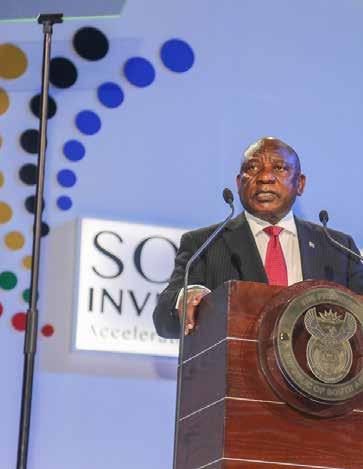
An array of pledges were made in key areas of the economy. Among them were pledges made in the digital economy, which saw R3.8 billion pledged by Equinix to develop new
data centres in South Africa. Meanwhile, Teraco made their fourth announcement this year, investing a further R2 billion to expand their data centre capacity and developing renewable energy projects to supply their data centres in Gauteng, the Western Cape and KwaZulu-Natal.
In the manufacturing sector, Alpha Manufacturing is investing R2 billion in recycling, packaging and manufacturing facilities in Gauteng and KwaZulu-Natal and Defy pledged for the third time by investing R288 million in their white goods manufacturing facilities in KwaZulu-Natal.
Several companies have also pledged to invest in the country’s special economic zones.
At the Richards Bay Industrial Development Zone in KwaZuluNatal, Alusouth is investing R373 million in an aluminum rod plant, while Bote Industries is investing R220 million in the production of rubber hoses. In addition, South East Bulk operations is investing R452 million in a logistics hub.
At the Coega Development Zone, Coega Steels is investing R160 million in an automated rowing mill while Newlyn Group is investing R4 billion in a manganese storing facility. In addition, Kict Energy is investing R500 million in the
production of smart liquefied petroleum gas cylinders.
Vodacom is among the companies that have pledged to invest in the global business services, information and communications technology and digital services category. At the fifth conference, the company announced that it has pledged an additional R60 billion over the next five years.
This was in addition to delivering on its promise to invest R50 billion over five years in 2018.
"As part of the fifth SAIC, Vodacom has pledged to invest a further R60 billion in South Africa over the next five years. Five years ago we heeded
the call from President Cyril Ramaphosa to play a central role in his investment drive aimed at attracting R1.2 trillion over a five year period.
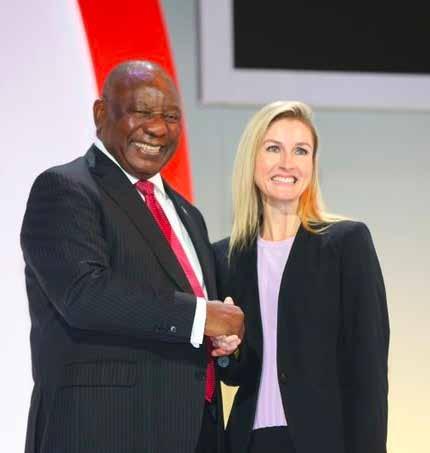
“Looking back over the past five years, we believe that our initial R50 billion pledge has played a significant role in fostering digital inclusion for all and helping to unlock economic and social opportunities for South Africa," said Vodacom Group Chief Executive Officer Shameel Joosub.
The President said government had honoured the undertaking it had given that it would attract new investment, support the growth of local businesses and create more jobs.
“When we set out on this ambitious path five years ago, none of us could have foreseen that the world would be struck by a deadly pandemic.
“Nor could any of us have imagined the lingering impact on investment, businesses, jobs, and livelihoods, even years after the existential health threat has passed,” said the President.
He described the achievement of the target as a “stellar” one and something the country should be proud of.
This is despite the challenges that currently face the nation, including the ongoing electricity crisis which is receiving attention.
While investment decisions often take some years to reach fruition, commitments made to date have already resulted in substantial investment in the productive economy.
"Almost 70% of the total number of projects announced since 2018 have either been completed or are on their way to completion. Approximately R460 billion of capital has been invested in building new factories, purchasing equipment, constructing roads, sinking mine shafts and rolling out broadband infrastructure," said the President. - SAnews.gov.za

South Africa is amongst the more than 110 countries that have committed to carbon neutrality by 2050 and thus are making strives to transition from high carbon to a low-carbon economy. This is according to the Presidential Climate Commission (PCC), a multi-stakeholder body tasked with overseeing and facilitating the low-carbon transition.

According to the Department of Forestry, Fisheries and the
Environment (DFFE), the 2018 Energy Sustainability Index developed by the World Energy Council ranks South Africa 85th on the Energy Sustainability Index out of 125 countries. The DFFE attributes the country’s low performance in environmental sustainability in this index to the electricity sector’s heavy reliance on coal.
The PCC is composed of Ministers and commissioners who represent diverse perspectives.
The commission developed the Just Transition Framework, which presents an opportunity to start dealing with practical issues relating to jobs, local economies, skills, social support and governance; and the Just Energy Transition Investment Plan (JET-IP), which sets out the scale of need and the investments required to achieve decarbonisation commitments for the five-year period – 2023 to 2027. The commission recently
held the National Colloquium on Electricity Recommendations, where it engaged with key social partners.
Happy Khambule, a representative of the business sector, who was among the panel members, was of the view that South Africa cannot afford to backtrack on energy transition. "We cannot run away from the international
movement towards decarbonisation," Khambule said. The business sector raised concern about government’s ability to implement the JET-IP and highlighted the need for regulations that create enabling conditions for businesses to thrive.
Discussions with youth organisations focused on the participation of young people in the energy sector, employment and skills development within the low-carbon transitioning economy.
"The transition must not happen in a way in which the money that we are given cripples our ability to have a future and develop South Africa into a nation that is able to cater for all who live in it," said climate change activist, Otsile Nkadimeng, who also emphasised the need to involve young people in discus-
sions on just transition energy plans.
Federation of Unions of South Africa General Secretary Riefda Ajam also weighed-in on the discussion. She raised points on issues of trust and collaboration within the transitioning movement.
"We cannot force our people into a system where they are not upskilled, reskilled and not prepared for what the future entails. We cannot set our people up for failure,” said Ajam. She noted that when the Just Transition Framework was presented to the social partners, it had already been presented to the world.
Faith organisations were of the point that the commission should have done more to engage people from all provinces. "As people of faith, we must stand for the poor and the marginalised because air pol-
lution is a human rights issue. The voiceless are those people whose health is impacted by air pollution," bemoaned Dr Rachel Mash a representative of the faith society.
Civil society partners acknowledged the necessity of the Just Energy Transition Plan but raised concern on what the future holds. "Critical to the question of electricity planning is the issue of socio-economic imperatives. If we transition to a renewable energy space, what is going to happen to the coal value chain where a lot of our people are employed?" asked South African National Non-governmental Organisation Coalition’s Jimmy Gotyana.
He recommended that the Just Transition Energy Plan should underpin sustainable development and be within the confines of social justice.
In her closing remarks, Forestry, Fisheries and the Environment Minister Barbara Creecy pointed out that it is South Africa's duty to contribute to the reduction of greenhouse gas emissions.
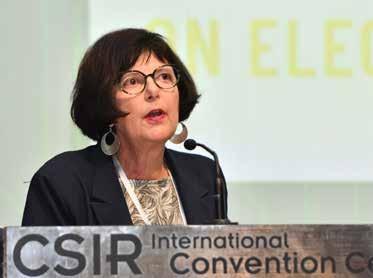
She added that debates and discussions are good for building consensus, noting that a solid plan based on trust is needed as the country moves towards the implementation stage.
According to the United Nations Framework Convention on Climate Change (UNFCCC), a just transition recognises that a shift to a more sustainable economy can have significant impacts on workers and communities that are currently dependent on fossil fuels. A just transition means transforming the economy and economic system in a way that is as fair and inclusive as possible to everyone concerned, creating decent work opportunities and leaving no one behind.
In March 2023, the UNFCCC published a paper that provides a compilation of country-driven strategies and best practices on economic diversification and transformation and just transition of the workforce and creation of decent work and quality jobs. The paper addresses not only the challenges but also opportunities arising from the implementation of low greenhouse gas emission policies towards the achievement of sustainable development and net zero economies.
The paper is titled “Implementation of just transition and economic diversification strategies: a compilation of best practices from different countries” and can be downloaded from https://unfccc.int/documents/624596.
Newly qualified teachers, like any other people entering the working
world for the first time, can easily be overwhelmed if they are not supported because there are some
on-the-job skills that are not part of their training.
According
to the Acting ChiefDirector of Education Human Resource Development at the Department of Basic Education (DBE), Lala Maje, who also started her career as a teacher more than two decades ago, newly qualified teachers are not fully equipped to deal with challenges that they face in schools.
“What you experience at the beginning of your career as a teacher can make or break you. For example, teachers have to mark attendance registers, prepare lessons in advance and get approval from heads of depart-

ment before they can teach, deal with different attitudes of learners and maintain order during the lessons, apart from ensuring that teaching and learning takes place,” she explains.
Other challenges faced by teachers include reporting and giving feedback on learners’ work, relations with parents and a disparity between teachers’ idealistic expectations and the classroom reality.
These are organised into themes that are based on the South African Council of Educa-
tors (SACE) Professional Teaching Standards, which are:
• teacher professionalism,
• learner motivation and engagement,
• inclusive education and teaching,
• curriculum, assessment and pedagogy,
• managing the learning environment,
• teachers access a rich repertoire of teaching practices, strategies, resources and applies them appropriately,
• managing the professional environment, and
• resources.
Maje adds that some teachers are even exposed to violence and bullying in the classroom and they have to find ways to manage that without compromising the quality of education.
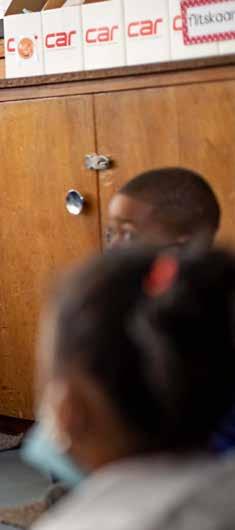
To address this, the DBE has introduced the New Teacher Induction Programme (NTIP) to help newly qualified teachers to transition smoothly into the classroom environment.
As part of the programme, the newly qualified teachers are paired with mentors who have more experience to enable skills transfer.
“Effective induction can ease this transition and enhance a new teacher's ability to make an impact on learners,” explains Maje.
The programme is also meant to help teachers who come from abroad and those who had left the teaching profession for more than five years before returning.
Maje says discussions around establishing the NTIP started about 15 years ago when Minister Angie Motshekga indicated that newly qualified teachers need to be supported.
The NTIP was established following the Teacher Education Summit that was held by the DBE in collaboration with the Department of Higher Education and Training (DHET) in 2009.
“The department, through the Initial Teacher Education Directorate, collaborated with the DHET, provincial education departments and partners including the SACE, Joint Education Trust Education Services, the North West University, Wits University and the Flemish Association for Development Corporation and Technical Assistance (VVOB) to develop an induction programme for all new teachers”, she adds.
Maje says the programme was piloted during the 2020 school calendar year and the DBE took a decision to phase it in this year in selected schools in four provinces – the Free State, KwaZulu-Natal, North West and the Western Cape.
“The aim is to ensure that all teachers will be part of the
programme from 2024 moving forward,” explains Maje.
She adds that the DBE in collaboration with VVOB will provide the support required by provincial departments in implementing the programme with the aim of creating a common standard across the board.
Maje says the SACE will in the near future determine the duration on the programme, according to their professional standards for teachers.
After completing the NTIP, the teachers will be ready to join professional learning communities to help them deal with curriculum-based challenges.
“There are subject advisors and mentors who can help teachers with those challenges,” she stated.
During a roundtable that was recently held by the DBE, VVOB representative Gerrit Coetzee said guiding material has been developed to assist newly qualified teacher and mentors.
“When the newly appointed teachers are supported and mentored, they become more confident in doing their job in the classroom, school and community. The NTIP also aims to show the new teachers where areas of continued professional development are,” he enthused.
Professor Lee Rusznyak from Wits University applauded the DBE for taking a brave decision to implement the programme.
said, remains vulnerable.
“We need to do something tangible to propel the small industrialisation. Africa is urbanising at the fastest pace. In probably less than 20 years, we will have more than 80% of the African population living in urban centres. That is where the demand is. Secondly, Africa is importing even commodities that we should be producing here,” he said.
In this regard, he cited examples of grains like soy beans, maize, rice and wheat, in the region of $30 billion, having to be imported.
“We are exporting jobs, we should be producing [this] locally,” he lamented.
To turn the tide, greater cooperation was needed to work with small farmers.
“We will not talk industrialisation if we do not have surplus.”
Bigwigs on economic development agree that the recent African Continental Free Trade Area (AfCFTA) Business Forum was a seminal moment in the prosperous economic fortunes of the continent.
Hundreds of delegates from every corner of the continent, in April, gathered at the Cape Town Convention Centre to foster private sector participation in the implementation of the AfCFTA on the journey to
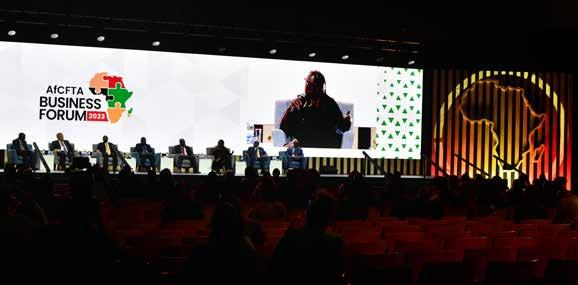
creating one African market. High on the agenda was a discussion on what processes were needed to grow Africa’s manufacturing and industrialisation capacity and increase value addition. In this regard, during the three-day convergence, delegates honed in on agriculture, agro-processing, pharmaceuticals, textiles and the mining sector.
Daniel Njiwa, Head of Regional Food Trade & Resilience at Agra,an alliance led by Africans with roots in farming communities across the continent, said the question of scaling up remained the elephant in the room on the topic.
“As Agra, our DNA is grounded on the small farmers. We believe the agriculture transformation, we believe industrialisation, will not happen without small farmers in the equation,” he said.
The industry’s ecosystem, he
Stavros Nicolaou, Senior Group Executive at the Aspen Pharma Group, in a panel discussion on the second day, emphasised that “local capacity solves local problems”.
“What do I mean by this? I am speaking to you as a pharmaceutical sector representative. I need not remind anybody in this room that during the peak and height of the COVID-19
pandemic, Africa was left completely in the lurch.
“All this notion about solidarity flew out the window and, without exaggerating, I felt like I was watching Hunger Games because it was every man for himself. Africa was left at the back end of the queue. Lives and livelihoods were lost because we could not get vaccines at the time,” he decried.
This, he said, should never be repeated. The free trade agreement is a “critical catalyst to achieving security of supply, sovereignty and independence, and above all, healthcare security for our continent”.
He called on the continent to never doubt its capabilities.
“We can [do it]. What needs to be done to realise this dream of industrialising this continent? In my sector, we are serial importers of medicines. We harbour the world’s most disproportionate disease of any continent, yet we import 99% of vaccines and 80% of our pharmaceutical requirements. It is counter-intuitive, it is counterproductive, for the continent," he elaborated.
The free trade agreement, he said, presents the biggest opportunity “to change this picture”.
“It provides an opportunity to aggregate our volumes in a coordinated, cohesive and collaborative fashion so we can start
competing with all the other jurisdictions and geographies. For far too long, we have been fragmented,” he said.
Nicolaou added that more work was needed for the continent to succeed in establishing a procurement mechanism that allows countries to start purchasing their key products and commodities and start manufacturing them.
“Let us work on a preferential framework and mechanism on the continent that has both economic and political, and operational buy-in from all countries. If we achieve that, we will be able to turnaround the fortunes of our continent through the multiplier impact that industrialisation and manufacturing brings,” he said.
The envisioned mechanism, he said, should be one that is akin to aggregating volumes.
Principal advisor on value chains at the AfCFTA Secretariat, Themba Khumalo, highlighted that the free trade agreement mandates the promotion of industrial development, diversification, regional value chain development and food security.
“As a secretariat, we needed a framework that can put this into practice. How do we engage with the private sector in the quest to boost intra-Africa trade, mainly in production,” he said.
“The AfCFTA is not just a trade instrument, it is an opportunity
for us to support development”.
In this regard, he said focus should be on the US$16 billion in opportunities in the importation of pharmaceutical products, US$15 billion in food, and transportation and logistics.
This, he said, was mainly on how it impacts the continent’s ability to support productive sectors on the continent.
While delayed, there had been discussions on the textile and automotive sectors.
“We have been able to put plans to consider a value chain analysis that would create a space or opportunity for everyone who has a role to participate, including getting support from some of our partners," he added.
The three-day forum heard that, to prosper, Africa should have mechanism that make it easy for those who can be able to feed into the plants to be able to do so.
Closing the Business Forum, Deputy President Paul Mashatile reiterated the need for Africa to reduce structural and regulatory barriers in order to unlock investment in road and maritime infrastructure, and facilitate successful intra-African and global trade.
“The quality of much of the continent’s maritime, road and
railway infrastructure is less than satisfactory. There are few road links, generally poor road infrastructure maintenance and limited regional road linkages throughout the continent’s five regions,” he said.
The Deputy President noted that, roads are the predominant mode of transport in Africa, carrying about 80% of goods and 90% of passengers.
“Without this infrastructure, rail and maritime trade cannot realise their full potential. Road transport is therefore an indispensable part of daily African economic activity and critical to facilitating cross-border trade and regional integration.
“Another impediment we must confront are inefficiencies at border posts, many official and unofficial inspection points along transport corridors and low road densities.”
Despite the obstacles, the Deputy President believes that the continent is on the right direction towards building a "one African market".
As of February 2023, he said, 47 of the 54 signatories to the AfCFTA had deposited instruments of ratification.
Mashatile believes that Africa is in a process of creating the world's largest single free trade area, with 1.3 billion people and a gross domestic product of US$3.4 trillion.
Meeting the United Nations (UN) Sustainable Development Goals (SDGs) by 2030 will require ensuring that necessary skills and capacity exist within the Public Service coupled with driving greater coordination and enhancing monitoring and reporting to deliver on goals such as good quality education.
These are some of the findings emerging from a study produced by the Wits University-based Centre for Researching Education and Labour (REAL Centre) as part of its commitments to support the Public Service Sector Education and Training Authority (PSETA). The centre and the PSETA entered into a partnership to contribute to pro -
viding evidence-based research to facilitate skills development and effective skills planning so as to contribute towards the development of a competent and capable state.
As part of the partnership’s deliverables, the REAL Centre wanted to understand firstly, whether the State has the skills and capabilities to work towards achieving the SDGs more broadly and secondly, what progress has been made to meet selected SDG 4 targets. Whilst there are seventeen overarching SDGs, in view of the focus of the PSETA, the research examined progress around three of the SDG 4 targets. The overall goal of SDG 4 is focused on ensuring inclusive and equitable quality education and promoting lifelong learning opportunities for all. However, the research focused on three targets within SDG
4, namely, 4.3, 4.4 and 4.7 which relate to both the provision of technical, vocational and tertiary education (including university) and ensuring youth and women have the relevant skills (including technical and vocational skills) for employment, decent jobs and entrepreneurship. The targets also relate to the provision of knowledge and skills to promote sustainable development. In seeking to evaluate the implementation of the targets, an overarching theme for the research process was also exploring elements of SDGs 16 and 17, as they cover dimensions of good governance and partnerships to deliver the SDGs, and effective monitoring and reporting.
In terms of meeting the targets, the research points to the fact that progress has been made towards achieving good qual-

ity education. Whilst there are a range of examples to illustrate this, it should be noted that despite the progress, the country ranks in the bottom third of UN member states in terms of progress against the SDGs. The examples cited in the research which reflect some progress include the fact that the country’s literacy rate is seen to be on track whilst there are also high levels of inclusive access as evident by the fact that female student enrolments are increasing, and above those for men, in Post-School Education and Training (PSET). In addition, there are examples of good practice in relation to education for sustainable development. From a policy perspective, the SDGs are
acknowledged in the National Development Plan (NDP). However, at a provincial level there is little direct reference to the SDGs, bar a few examples, such as in KwaZulu-Natal and the Western Cape. However, most provinces do indirectly implement SDG 4-related activities and initiatives.
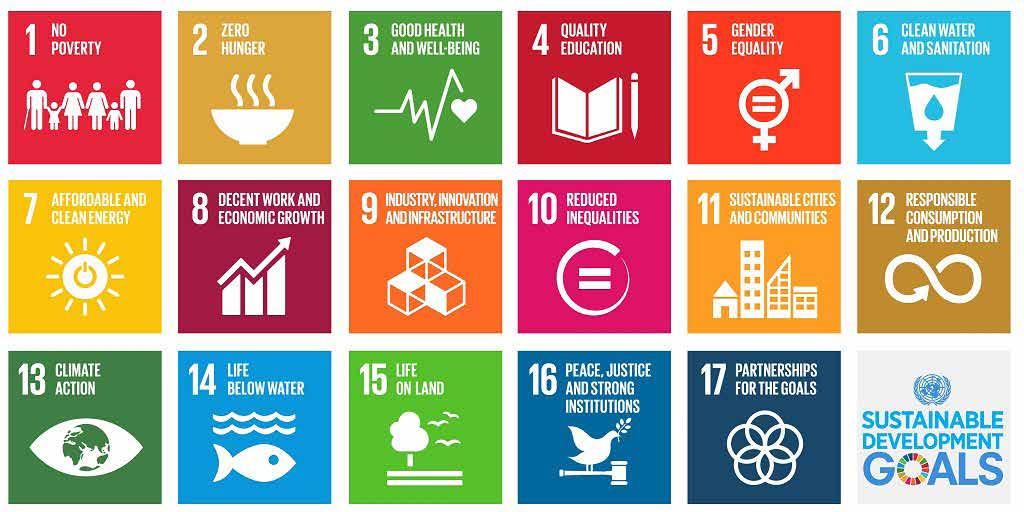
In terms of the specific focus on 4.3, 4.4 and 4.7, whilst they are acknowledged more broadly within national government, they are not specifically referenced, with links to the NDP being more apparent. In addition, in terms of SDG 4.7, there are some challenges as this target was not reported on in the 2019 national progress report.
Whilst the policies are in place
and the commitment to deliver quality education is there on paper, it is questionable the extent to which these values are inculcated into how public servants perceive their role. Then there are issues around allocating additional funding and investment to achieve good quality education such as investing in information and communication technology infrastructure, laboratories and bursaries. Mention has been made about strengthening coordination and partnerships both within government and with the private sector to ensure effective delivery as well as upskilling lecturers and teachers to deliver better quality education. In relation to monitoring and reporting, the research
notes that there are structures in place to achieve this (especially since Stats SA set up a portal to track progress around SDG implementation), there are challenges in ensuring higher education and other important institutions report against the targets. In the absence of this, it becomes difficult to show that the country is providing inclusive quality education, if the SDG indicators are to be used as a sign of progress.
Turning to the issue of whether national and provincial government has the required skills and competencies to deliver on targets 4.3, 4.4 and 4.7, the research found that there is adequate provisioning of courses across all levels of qualification for the
public sector to capacitate itself to meet core overarching SDG indicators. However, it was not clear as to the level of integration of the SDGs and for that matter the NDP as the SDGs are key to the NDP.
The study brings into sharp focus some key underlying factors which could contribute towards a state which can deliver not only in relation to the SDGs but more broadly. Following a review of countries that illustrate good practice in delivering on 4.3, 4.4 and 4.7 coupled with engagement with key stakeholders, the research team has proposed the following interventions which could assist in guiding the public sector to improve its delivery of the targets:
Publicly illustrating the importance and value of inclusive and equitable education.
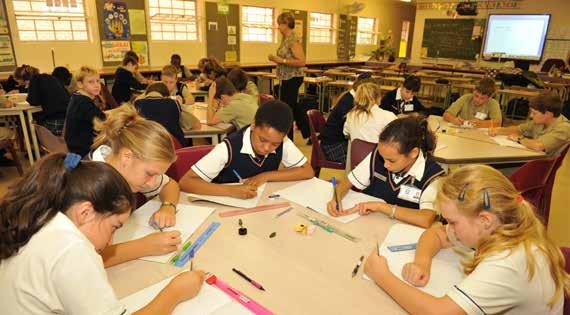
Ensuring the education system is adequately skilled to develop supporting policy, governance and finance of PSET institutions, adapt curricula and ensure staff and teachers are adequately capacitated.
Ensure effective partnerships are in place to activate delivery, and to coordinate the capacitation of the public sector (for example, senior
government officials, policy developers, post-school education leadership) to deliver and report on the targets.
Develop context-specific indicators for each of the targets to ensure implementation of the SDGs is country relevant.
Build on the measurement and reporting frameworks put in place by the Department of Planning, Monitoring and Evaluation and Stats SA to enable education institutions to improve the gathering and analysis of data. Whilst public
servants should be focusing on the SDGs, it should not just be about meeting the 2030 deadline but looking beyond to ensure sustainability and commitment to effective delivery in line with the Batho Pele Principles.
The SDGs were introduced as a blueprint for countries across the globe to build societies that are sustainable and most importantly to reduce poverty and inequality. In a country like South Africa and where the country is currently located,
the SDGs should not just be a tick-box exercise. They should be imprinted in the minds of all public servants (and politicians) and this should be driving a collective response to effective delivery so as to build a new generation of young people who have the knowledge and skills to contribute towards their own sustainability and those of their communities. If we truly believe in ensuring that “no one is left behind,” building skills and knowledge should be key to actualising this.
• Target 4.3: By 2030, ensure equal access for all women and men to affordable and quality technical, vocational and tertiary education, including university.
• Target 4.4: By 2030, substantially increase the number of youth and adults who have relevant skills, including technical and vocational skills, for employment, decent jobs and entrepreneurship.
• Target 4.7: By 2030, ensure that all learners acquire the knowledge and skills needed to promote sustainable development, including, among others, through education for sustainable development and sustainable lifestyles, human rights, gender equality, promotion of a culture of peace and non-violence, global citizenship and appreciation of cultural diversity and of culture’s contribution to sustainable development

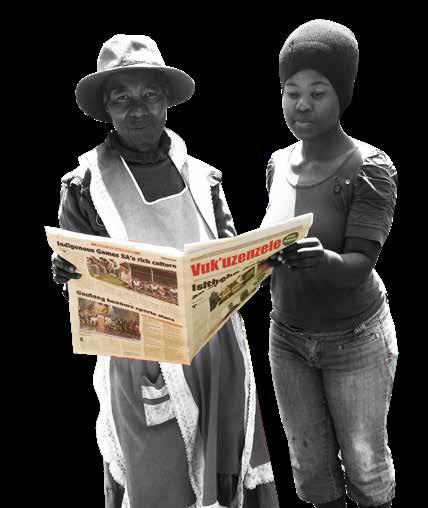

South Africa has committed to ensuring access to water and sanitation for all, as outlined in Sustainable Development Goal 6. Additionally, Chapter 2 of the Constitution of
the Republic of South Africa, 1996 recognises the right of access to sufficient water of adequate quality as being essential to a good quality of life. To give effect to this right, the Water Services Act,
1997 (Act 108 of 1997) mandates municipalities to provide water to communities within their respective jurisdictions.
Despite this, many rural municipalities have difficulty supplying
water services to their residents due to infrastructure backlogs, weak revenue bases and the need to service a landscape characterised by dispersed dwellings. Consequently, many
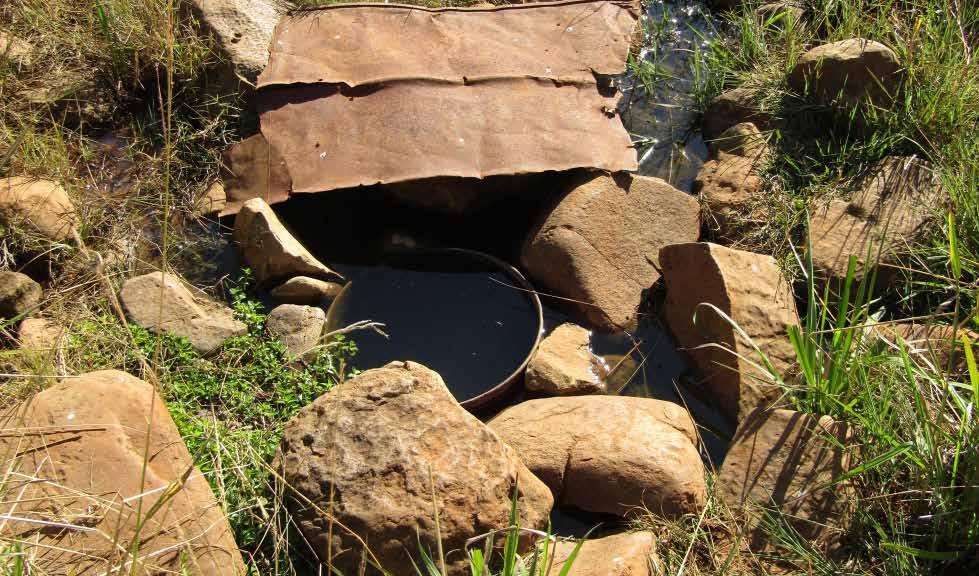
rural households across South Africa rely directly on natural springs for water supply.
Although springs are a crucial water resource for a significant number of households in rural communities across South Africa, the utilisation of groundwater has not been researched extensively. To address this gap, a multidisciplinary research team worked together to implement a water research commissionfunded project in the Thukela and uMzimvubu River Catchments of the Eastern Cape and KwaZulu-Natal. The two-year project focused on investigating innovative solutions to address water insecurity in rural areas. In a collaborative project with Ezemvelo KwaZulu-Natal Wildlife; the Department of Agriculture, Land Reform and Rural Development; the South African National Biodiversity Institute
and the University of KwaZuluNatal, the Council for Scientific and Industrial Research worked alongside two rural communities in the Eastern Cape and KwaZulu-Natal to understand the adaptive capacity of these groundwater-dependent rural communities to the impacts of climate change on spring water supply, through holistic catchment management.
The project study area falls within two of South Africa’s strategic water source areas for surface water that are situated in the Drakensberg Mountain region.

Titled “Promoting the adaptive capacity of rural communities to climate change through holistic catchment management: a case study of groundwater-dependent communities in two catchments” and given the tag line “Spring 4 Life”, this collaborative project
was undertaken working closely with selected communities in communal lands. The team aimed to review the available tools and mechanisms for the protection, rehabilitation, and utilisation of springs to understand the relevance of social-cultural behaviours, beliefs and perceptions that influence the dependence on and restoration of ecological infrastructure, and co-develop innovative strategies and frameworks to respond to climaterelated changes in groundwater supply.
As a water-scarce country, the role of groundwater has gained importance since being considered an undervalued resource that is now vulnerable to the impacts of climate change. The springs in the areas under study are vulnerable due to siltation, the infestation of the catchments by invasive alien vegetation, contamination by household waste and livestock activities. Both catchment communities consider the springs as their primary source of drinking water, in addition to providing cultural ecosystem services for spiritual and religious purposes.
A highlight of this project is that because communities view spring protection as an essential element to ensure water quality and safety, they have taken it
upon themselves to implement spring protection measures, mostly with the support of nongovernmental organisations. However, many of these actions are challenged due to resource constraints and prove to be ineffective in guaranteeing good quality water. A framework has been co-produced with the communities to guide the governance of groundwater in the two study areas.
Importantly, the framework emphasises the need for the explicit recognition of springs in municipal integrated development plans, coupled with setting aside budgets to improve spring management and protection to provide better access to clean water for rural communities.
The final project report acknowledges that although springs are widely used for household water in the research sites, attention still needs to be paid to administrative processes related to procedures to safeguard springs, monitor their quality, and establish community standards for their use.
Participatory governance processes could assist in ensuring accountability by both government institutions and water resource users. A further study is needed to better understand other dynamics connected to the use of springs and their protection in a changing climate.

Five African mainland and five island states in the Western Indian Ocean have become allies in their vision for healthier coasts and oceans. Comoros, Kenya, Madagascar, Mauritius, Mozambique, Seychelles, Somalia, South Africa, Tanzania and France share an understanding of the economic value of their region’s coastal and marine resources. Coastal and marine experts at the CSIR, in partnership with the Nairobi Convention Secretariat, proposed a strategic framework to improve marine and coastal water quality management in the region.
The Western Indian Ocean (WIO) region’s coastline spans more than 15 000 km, with over 60 million people living within 100 km of the coast. An annual gross marine product of about US$20.8 billion is testament to the significant economic value and investment opportunities of the region’s coastal and ma-
rine resources. However, many problems, such as climate change, destructive fishing practices, coastal degradation and marine pollution are threatening coastal and marine ecosystems in the region, with negative impacts on its marine diversity, food security and economic development.
A situation assessment found that marine pollution in the WIO stems from several root causes, including population growth, poverty and inequality, inappropriate governance, inadequate knowledge and awareness, and lack of financial resources.
While these root causes characterise the indirect underpinning societal dynamics causing ecosystem deterioration, the CSIR found that the major sectors contributing directly to marine pollution are urban
development and tourism; agriculture, forestry, fisheries and aquaculture, industry; and mining, marine transportation, and energy production.
The Nairobi Convention is a regional treaty and one of 18 initiatives under the United Nation’s Regional Seas Programme.
Its primary aim is to promote the sustainable development of marine and coastal environments of the WIO region, pursuing a vision of healthier coasts and oceans. The five African mainland and five island states join more than 140 countries that participate in the larger Regional Seas Initiative. The convention offers a regional legal framework and coordinates the efforts of member states to plan and develop programmes that strengthen their capacity to protect, manage and develop their coastal and marine environments. Contracting parties considered a regional strategic framework for coastal and marine water quality management as an essential tool to address marine pollution threats.

It is needed to fast-track coordinated implementation, building on previous initiatives undertaken. “Our proposed
strategic framework calls for more holistic, ecosystem-based approaches to management responses, rather than the fragmented, silo-based approaches that are currently applied in most countries,” says Dr Susan Taljaard, CSIR Principal Researcher and expert in coastal and marine water quality. The strategic framework underpins the contracting parties’ objective for water quality in the WIO region to meet international standards by 2035. A set of key guiding principles provides broad direction for the implementation of water quality management, while regional support and guidance, through
the convention secretariat and partners, remain essential to harmonise management initiatives across countries in the region.
“The development of regional water and sediment quality guidelines, as developed by the CSIR, in collaboration with the Nairobi Convention Secretariat, is an example of such support,” reports Taljaard.
Another key element in the strategic framework addresses the establishment of appropriate institutional structures and arrangements necessary to execute such ecosystem-based implementation processes. Taljaard emphasises that,
“Effective ecosystem-based marine and coastal water quality management cannot be achieved without dedicated institutional bodies to drive implementation.”
“The CSIR will continue to play its role in the WIO region through ongoing scientific research, sharing scientific information and learning with key strategic partners to enhance and explore innovative solutions to eradicate both indirect and direct causes of marine pollution. This will help the region to achieve its objective of being on par with international best practice in water quality by 2035,” Taljaard concludes.
Have you updated your wardrobe for the cold weathers yet? If not, do not worry I have tips on how gents can stay warm and fashionable this winter.

Grunge and Y2K
A nostalgic look at the 1990s and early 2000s. Flannels, mixed colours and textures, dark shades like black, grey, burgundy, and navy blue make up this rising trend.
Denim jackets, biker jackets and layering are important for this season. Although primarily youthful, worn right, it can give you the opportunity to take part in this fun throwback trend.

We are taking it back to basics with the lingering ‘home comfort’ trends that bloomed from the COVID-19 pandemic. Think loungewear that can be worn outside your lounge; all the toned down, easy to pair colours of loungewear with a bit more structure, making it acceptable to wear outdoors without looking like you are still in pyjamas. Crew necks can be paired with tapered but elasticated pants and sneakers, all in neutral tones: beige, khaki, grey, white, cream. It is all about minimalism and sophistication that can be taken from work to Friday evening drinks and Saturday lunch dates with family or friends.
1. TSHEPO Coat available at www.tshepo.shop for R8 000

Sweater in Wool & Mohair available at www.fieldsstore.com for R5 500

www.myrunway.co.za
* Prices correct at the time of writing

9.
7.
10.
ability) at all MAXHOSA stores for R3 500


800
This trend has grown bigger and bigger as people learn to embrace being in the great outdoors; especially since we are becoming more enthusiastic about taking good care of ourselves. Having spent the last three years surrounded by concrete walls, clothing is becoming more reflective of nature’s beauty and how we are all learning to appreciate it more.
What one might consider the perfect outfit for camping or fishing, can now be worn on any other day – like cargo pants, utility vests and overalls.



To fit these items into your work wardrobe, pair them with more subtle pieces or borrow from the trend’s colours (olive green, dark grey, khaki) with smart silhouettes like blazers, trench coats and buttoned shirts.

8.
11.
12.
299

*Rangaka is the founder of NEO by Neo Victoria Rangaka (NVR), a premium African brand aimed at creating designs that redefine the African identity. You can contact her on 082 929 7653 or nvrangaka@gmail.com or Instagram: @neovictoriarangaka or @neobynvr.

* Prices correct at the time of writing

Eating healthy does not have to be boring or costly, and one of the easiest meals you can prepare for you and your family this winter is oven-baked chicken and vegetables. In this edition, Fikile Zungu, who is affectionately known as Fikz to her fans and social media followers, shares her favourite chicken and vegetables recipe.
“I really love chicken and vegetables. There are many ways to best prepare this dish. It is affordable, quick and easy to prepare,” Zungu says. She adds that this recipe works best if you want to make your vegetables tasty and tantalising.

Ingredients:
1 full chicken cut in half.
1 kg of potatoes cut in halves.
1 zucchini cut in moon shapes.
250 g mushrooms.
3-4 carrots diced.
2 Small red onions cut in halves.
Butter.
2 tablespoons of teriyaki sauce.
Aromat.
Spices: chicken spice, coriander, lemon and herb spice, cajun spice.
Fresh thyme and coriander.
1 fresh lemon squeezed.
Salt to add taste.
Season the chicken, potatoes, carrots, and onion with spices.
Drizzle with melted butter and massage through.
Transfer in an oven pan and
bake on 180 °C until chicken is cooked inside and potatoes are soft and golden brown.
While waiting for the chicken to cook, melt butter in a pan and fry mushrooms until they are golden brown.
Sauté the zucchini in the same pan and add a bit of lemon juice and Aromat (while sautéing).
When chicken and veggies are all cooked, add everything in a baking pan.
Take a bowl and mix teriyaki,
the rest of the lemon juice, fresh herbs and melted butter and pour the mixture in a baking pan.
Shake well and grill for 5 minutes.
Enjoy the meal with white wine of your choice.
Zungu is a Belgium-based self-taught cook who hails from Soweto. She is the founder of the Maid to Cook brand, which is inspired by her life story.
“I started-off as a maid before I became a self-taught cook. I did not have any tertiary education and I was a breadwinner at home. I found no joy in doing that job but my family had to eat,” she recalls.
Zungu is the author of Cooking with Fikz and is currently working on her second book.

You can follow and contact Zungu on social media platforms:
maidtocook
cooking with fikz @fikz411
fikz_the_cook

Source: Gauteng Tourism Authority
Images: Gauteng Tourism Authority
The Cradle of Humankind World Heritage Site (COH WHS) is located in the north-western quadrant of Gauteng. It is a 53 000-hectare (ha) area situated about 45 kilometres northwest of Johannesburg, ap -

proximately an hour’s drive from both the O.R. Tambo International Airport and the City of Johannesburg.
It was proclaimed a World Herit-
age Site by the United Nations Educational, Scientific and Cultural Organization in 1999 because the area has produced a host of globally significant and unmatched fossils that throw light onto early human ancestors
and their relatives, dating back more than 3.4 million years. To date, more than 900 catalogued fossil hominin specimens have been recovered. The Sterkfontein excavation (one of the 15 fossil sites) has been active since 1966, making it the world’s longest sustained palaeoanthropological excavation.


The weather at the Cradle of Humankind is pleasant all year round. The summer months (September – April) are hot with afternoon thundershowers. The
winter months (May – August) are usually cold in the mornings and evenings.
What does it offer a tourist?
• A whole lot of living where life began – over 440 diverse visitor experiences.
• All connected by magnificent scenic routes, offering a variety of experiences for the international and domestic tourists, business or leisure traveler, including business (meetings, conferences and events), leisure (adventure, tranquil escapes, wedding, family and kids-friendly) and related complementary offerings.
What can you do in the area?
• The Cradle of Humankind offers an exciting adventure
for all members of the human family, young and old.
• This site of outstanding universal value is famous for, amongst many other fossil sites, the Sterkfontein Caves, where Dr Robert Broom discovered Mrs Ples – an ancient hominin skull that turned out to be around
2.15-million years old – in 1947. There are also other caves to be explored.

• In 1997, Little Foot – a virtually complete 3.3 million-year-old skeleton of a bipedal specimen belonging to the genus Australopithecus was discovered in the Sterkfontein Caves.
• Australopithecus Sediba was discovered in 2008 by Dr Lee Berger. The fossil, which dates back 1.977 million years ago, is one of the most complete fossils ever discovered and has been named Karabo.


• The site continues to yield groundbreaking evidence on the origins and evolution of humankind, confirming the notion that Africa is indeed the cradle of all humankind.
• Hiking, cycling and picnicking are amongst the activities available for those that like the outdoors.
• Adventure addicts can enjoy river rafting, quad-biking and hot air ballooning over a pristine 53 000-ha site.

• Nature enthusiasts have a variety of nature reserves and nature-based activities to choose from.
• The site offers wining and dining, some of the country’s premier wedding venues, arts and cultural experiences and much more.